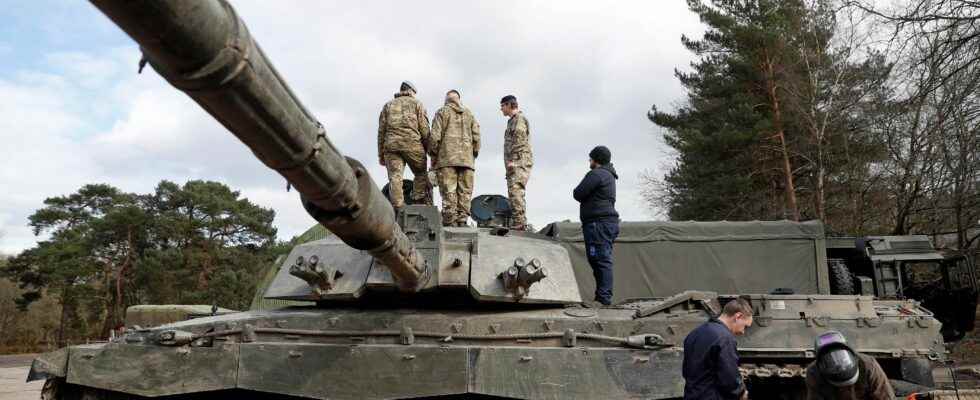The Ukrainian President repeated that he expected “strong decisions” from this summit. The countries, which militarily support kyiv, are holding a meeting on Friday January 20 at the American base in Ramstein, Germany. The United States, the United Kingdom, Sweden and Denmark have promised substantial arms deliveries to Ukraine, but no heavy tank, eagerly awaited by the Ukrainian army to be able to counter the Russian offensives, has not yet been delivered.
This meeting is the third in this so-called “Ramstein” format since the start of the conflict. Defense ministers and senior military officials from some fifty countries gather around US Secretary of Defense Lloyd Austin. “We are preparing for Ramstein tomorrow. We expect strong decisions. We expect strong military support from the United States,” Volodymyr Zelensky said in his Thursday night video address.
New weapon deliveries, not powerful enough
The list of this new delivery is long: Washington will release a new military aid of 2.5 billion dollars, including 59 Bradley armored vehicles, which will be added to the 50 light armored vehicles and 90 Stryker armored personnel carriers promised at the start. But also 53 anti-mine armored vehicles and 350 “Humvee” transport vehicles. This new package brings the total US military assistance to Ukraine to $26.7 billion since the start of the Russian invasion on February 24. But still no heavy tanks in the order, such as the “Abrams”, which the United States says is not yet ready to supply kyiv for maintenance and training reasons. “Thank you for providing Ukraine with another powerful defense support program,” the Ukrainian head of state said on Twitter this Friday morning. The weapons provided for in this new package “are an important aid in our fight against the aggressor”, he acknowledged.
For its part, the United Kingdom has pledged to send Ukraine an additional 600 Brimstone missiles. Denmark, 19 French-made Caesar guns, and Sweden Archer self-propelled guns. Systems that all have a range of several tens of kilometers, less than that claimed by the Ukrainian authorities. The latter say they need missile systems with a range of more than 100 km to be able to hit the Russian supply chain, in particular ammunition depots.
While London had already promised 14 Challenger 2 heavy tanks to kyiv, Poland also says it is ready to deliver 14 German-made Leopard 2 combat tanks, if Berlin finally agrees to authorize their delivery (any delivery of German war material must go through the German government). Germany’s new defense minister said on Thursday that the answer on this subject would be “clear within the next few hours or tomorrow”.
Why is Ukraine asking for heavy tanks?
Even with the German tanks, the total would still be far from the hundreds of such vehicles that Ukraine says it needs to stand up to the Russian army. “You need German tanks, Finnish tanks, Danish tanks, French tanks, this means that Western Europe itself must now allocate more modern tanks to Ukraine, so that it can simply defend itself “, thus pleaded the Polish Prime Minister Mateusz Morawiecki. “Against thousands of Russian tanks, the courage of our army and the motivation of the Ukrainian people are not enough”, hammered the Ukrainian president Thursday 19.
Experts say modern, Western-designed heavy tanks would be a crucial advantage for kyiv in looming battles in eastern Ukraine, where Russia is back on the offensive after suffering heavy setbacks this winter. But Westerners fear that kyiv will cause an escalation by using these weapons to strike deep into Russian territory and the air and naval bases of Crimea, a peninsula annexed in 2014 by Russia and which Volodymyr Zelensky announced on Wednesday January 18 that he wanted to resume . The Kremlin also sent a clear warning to the international community on Thursday: the delivery of longer-range weapons “would mean that the conflict would reach a new level”.
Russia targets American for ‘espionage’
This could be yet another way for Russia to put pressure on Ukraine’s allies: the FSB has opened an investigation against an American citizen for espionage. The Russian security service announced it on Thursday January 19, in the midst of a diplomatic crisis between Moscow and Washington, which has strongly supported Ukraine since the start of the war. The FSB did not specify the identity of this American citizen, or if he had been arrested, or even if he was in Russia or abroad. “The American is suspected of having collected intelligence relating to biological matters that go against the security of the Russian Federation,” the security service said.
In Washington, the State Department said “to be aware of this unconfirmed information of an investigation targeting an American citizen” while stressing that “in general, Russia does not respect its obligations to notify in time and timely any detention of U.S. citizens in Russia.” Several American citizens are currently being held in Russia, which contributes to poisoning relations between Moscow and Washington. Americans and Russians accuse each other of detaining their respective nationals for political purposes. Several prisoner exchanges have taken place in the past.
